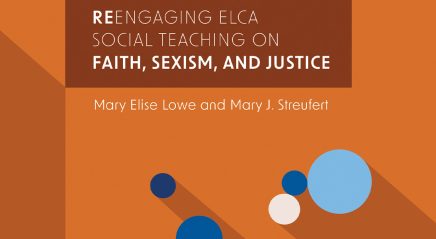Series editor’s note: In 2025, “Deeper understandings” is focusing on the ELCA social statements. We hope to reintroduce them to readers as a means of provoking fruitful, enriching conversation between Christians with different understandings and convictions, and as a springboard for active discipleship in the world. Each article will introduce a particular statement and its Lutheran theological underpinnings, then suggest ways in which it can spark faithful conversation and action in the service of your baptismal vocation.
My hope is that you will find this series relevant to your current context and that it will help you express your Lutheran faith in your daily interaction with family, friends, neighbors and co-workers—for the sake of the flourishing of the gospel of Jesus Christ in the world and the life abundant of the neighbor and stranger.
—Kristin Johnston Largen, president of Wartburg Theological Seminary, Dubuque, Iowa, on behalf of the ELCA’s seminaries
In 1999 the ELCA Churchwide Assembly approved the social statement “Sufficient, Sustainable Livelihood for All.” It describes the church’s position on economic activity and how Lutheran theological teachings encourage us to engage in economic life.
First and foremost, it’s important to note that economic life is more than a concern about material needs, the acquisition of commodities and the distribution of resources. Indeed, it includes all those things, but it’s also a matter of ethical and spiritual concern. We have a moral imperative to work for a sufficient, sustainable livelihood for all people.
As income inequality increases worldwide, people in many countries fall behind economically, for a variety of reasons, and lack what they need to subsist. The same economic system that produces riches for some produces scarcity for others and even misery for many.
The social statement refers to economic life as “a means through which God’s purposes for humankind and creation are to be served.”
Economic decisions in our current political climate seem arbitrary in ways that the social statement could not have anticipated. The statement speaks reasonably about real and imagined needs in the way we live today. It warns against stressing competition over collaboration for the production of goods and services, while calling attention to the constant challenge of providing enough for everyone to flourish.
The theological rationale is sound. God is the one who “executes justice for the oppressed; who gives food to the hungry” (Psalm 146:7). This view of God is revealed in Jesus, who promised to “bring good news to the poor” (Luke 4:18). The social statement refers to economic life as “a means through which God’s purposes for humankind and creation are to be served.” God wills the good to all. Therefore, we are called to be stewards of the earth’s resources and to secure a fair distribution of earthly goods for everyone.
Yet these theological convictions don’t keep us from challenging confrontations with the harsh realities of economic life.
Our knowledge of financial and market forces is incomplete, subject to complex tradeoffs, and is affected by the ambiguities of human psychology. It matters that many people live precariously between subsistence and deprivation. Poverty is not a blessing. The statement clarifies that it’s not the poor who are the problem in economic injustice, but the lack of access to needed resources, including the basic necessities of life.
Practical recommendations
“Sufficient, Sustainable Livelihood for All” has practical recommendations. It suggests that tax rates and government regulations should not be obstacles to the services necessary for people to make a decent living.
The statement supports socially responsible investment in community development projects that empower low-income people, family planning and enhanced opportunities for women in the workforce, including their participation in political and civic life. Moreover, identifying and addressing barriers to human development is identified as a must, a means of preparing the path to create strategies for a sustained livelihood. It also recommends commonsense approaches to environmental policies.
Economic assumptions can conflict with our Lutheran beliefs about the significance of reciprocal relationships, interdependence and the communal sharing of resources. We believe the well-being of all creation and people, especially those who live in poverty, flows from our God-given vocation. When we say the Lord’s Prayer, we pray not only for ourselves but for everyone else. We believe that everyone can experience life abundantly.
Work matters, and the statement suggests that we need to recover a sense of vocation in work. It should be more than the satisfaction of wants and desires—its aim is to sustain humans and creation. But work can become toil as a consequence of human sin (Genesis 3:17, 19). Unfortunately, economic injustice drives people away from the fruits and value of their work. It injects fear of losing a livelihood to competition, market forces, and the greed of corporations or individuals in positions of power. Work dignifies, but it needs to be performed in freedom and responsibility, recognized in all its value and rewarded fairly: a true living wage, sufficient and sustaining of a good life.
Work matters, and the statement suggests that we need to recover a sense of vocation in work.
Through the statement, the church asks for cooperation between workers and management rather than conflict. Organized labor is often needed because of power imbalances. Hiring should be done without discrimination. Sufficient compensation and the provision of adequate benefits should be every worker’s right.
As church, we are called to fight for working conditions that respect and help preserve human dignity and freedom, to support initiatives that protect fair compensation for all work and provide safety in the work environment.
We first summon ourselves to practicing generous giving to programs and initiatives that serve the needs of others. The ELCA also calls for governments to provide public assistance to those in need, as well as funding services and programs that benefit the poor.
This social statement declares that we are a people called to uphold the God-given dignity of every person and to foster hope in the God who cares for each individual and community and whom we approach in prayer for all our needs. These actions align with our core values as Christians.
Get this column in your inbox: Visit livinglutheran.org/subscribe and sign up for the free email digest “LL Stories.” Receive the digest weekly, biweekly or monthly, and select the categories that interest you. (“Deeper understandings” is a “Theology & Beliefs” column.)








